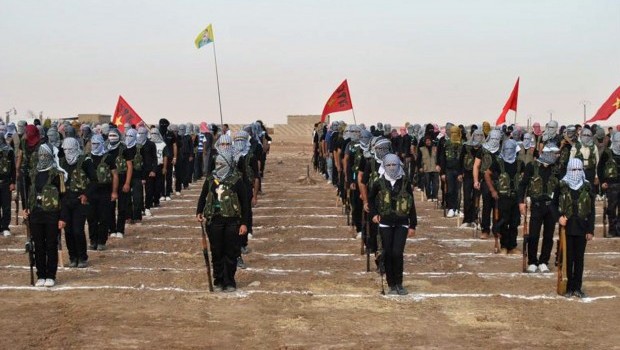
Kurdish opposition fighters attend a ceremony on July 18, 2013, in the northern Syrian border village of Al-Qamishli. At least 29 people have been killed in fighting between Kurdish and jihadist fighters in northern Syria in the past two days, the Syrian Observatory for Human Rights said. (AFP PHOTO/STR)
The town of Tell Abyad is situated roughly 65 miles (105 km) north of Raqqah. It has a population of some 30,000—a mixture of Kurds and Arabs—and is considered to be an international border between Turkey and Syria.
Local activists said: “The attack came against the backdrop of the Kurdish refusal to swear allegiance to the emir (leader) of the group/state, Abu Musa’b, who was arrested by a Kurdish military formation on Saturday and later released in a prisoner exchange deal between the two parties.”
A member of the Local Coordination Committees in Syria, Miral Baroudan, told Asharq Al-Awsat that “many Kurdish villages in Tell Abyad have been targeted, bombed and shelled.”
In addition, the committee member noted that ISIS had encouraged the Kurdish citizens to either leave the city immediately or swear allegiance to the “emir of the state,” using the minarets of local mosques.
Sixty Kurds were taken prisoner in Tell Abyad.
Baroudan affirmed that “the conflict in the Raqqah province and its surroundings has turned from a conflict between secular and extremist currents into a conflict between Kurds and Arabs. This is very dangerous [and] will harm the revolution.”
Regions with a Kurdish majority in eastern Syria have been home to violent battles between the two sides for a number of weeks. Following heavy clashes that claimed 29 lives, Kurdish fighters were able to completely expel Jabhat Al-Nusra militants from Ras Al-Ain, a northern city on the border with Turkey. The fighting later spread to the Tell Abyad area and the Raqqah province.
In contrast, Abu Firas Al-Halabi, an activist, said that “the Ahrar Al-Sham movement, Jabhat Al-Nusra, the Islamic State of Iraq and Syria, and some of the battalions of the Free Syrian Army have been able to exercise complete control over these rural areas, where they have swept the area for some improvised explosive devices that have potentially been planted there.”
“The battle will not stop until the last element of the Kurdish PKK organization has been expelled from the whole of the Tell Abyad area,” Halabi continued.
Meanwhile, a member of Ahrar Al-Sham pointed out that “the combat is directed against a specific faction of the Democratic Union Party (PYD), who are allied with the regime—not against the Kurds.”
In turn, the London-based Syrian Observatory for Human Rights reported that Jabhat Al-Nusra and ISIS reinforcements arrived at the border town of Tell Abyad and the city of Raqqah, pointing out that “neighborhoods in the Kurdish city [Tell Abyad] were looted by some battalions in the Syrian opposition forces.”
“The looting took place on the outskirts of the city amid clashes between units protecting the Kurdish people and the ‘Kurdish Front’ battalion on one side, and fighters from Jabhat Al-Nusra and [ISIS] on the other.”
The report also highlighted that “a female Kurdish citizen had been killed after coming under fire while leaving the city,” in addition to successive news about the death of a fighter from a brigade of the Kurdish Front, a day after having been detained for his participation in negotiations between the two sides in conflict at Tell Abyad.
There were also reports indicating that Jabhat Al-Nusra and ISIS had bombarded the villages of Yabisa, Tell Fender, Tell Akhdar and Sousak.
Furthermore, the observatory quoted activists as saying that the Kurdish Front—a recent addition to the battle—was able to destroy one tank and disable a second during clashes in the Tell Sawilah area.
Ongoing and sporadic clashes took place in the villages of Yabisah, Tell Khadr, Sakriyah and Kharbah Saan, while violent clashes took place between the two sides in the village of Tell Fender.
